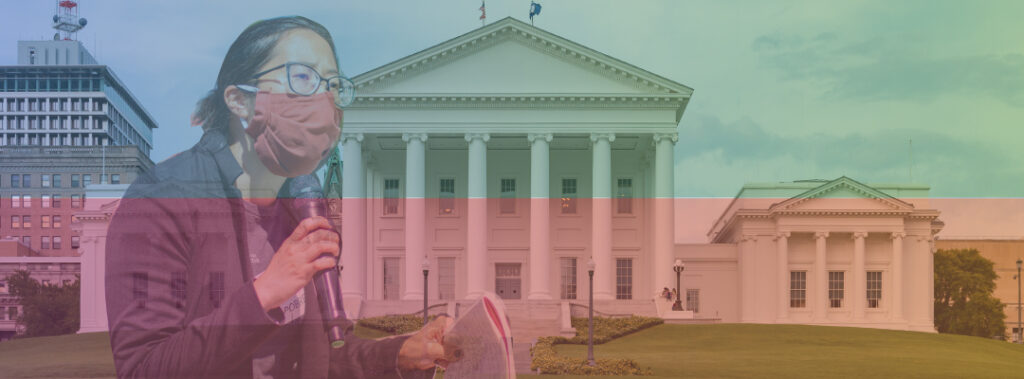Big Wins – LAJC at the 2021 Legislative Session

The 2021 General Assembly session is wrapping up, and all the bills and budget amendments that passed the Virginia House and Senate are on their way to the Governor to be signed into law. Successfully advocating for legislation at the GA is a tough job in the best of circumstances, but during a pandemic, with legislators meeting either virtually or isolated in the Richmond Science Museum, it took extra dedication and vigilance from community members, advocates, bill patrons and LAJC staff to help push so many significant changes across the finish line.
Below is the long list of new legislation that, once signed, will help to bend our systems towards community-focused justice. While there is always more to do, and we didn’t achieve everything we set out for, we are very proud of the work we accomplished in partnership with communities across the state.
The General Assembly passed criminal legal system reform bills that will:
- Establish a system of automatic criminal record sealing. This groundbreaking compromise legislation represents the first major change to Virginia’s record sealing laws in over 40 years and will eliminate significant barriers to employment, housing, and education for hundreds of thousands of Virginians. When the bills take effect in 2025, Virginia will automatically seal cases that were dismissed or dropped as well as nine critical misdemeanor convictions. Individuals will also be able to petition to seal convictions for other misdemeanors and low-level felonies such as larceny and drug possession. The bills also force private companies that profit from the sale of criminal records to delete records the state has sealed and allows individuals or the attorney general to sue these companies if they do not comply.
- Fix some glaring issues in the use of fines and fees in our court system, including cutting back on the accrual of interest on court debt following incarceration and eliminating the requirement for down payments, which often creates barriers to people accessing payment plans.
- Create a statewide pretrial data aggregation system with public access to the underlying data—this step forward represents years of work by community members and partners in our Pretrial Justice Coalition, and will be among the first of its kind in the country. Anonymized, aggregate data will help Virginia bring our pretrial system out of the shadows and provide critical information to direct reforms.
- End the presumptions against pretrial release and bond that for decades have led to the incarceration of Virginians simply because they were accused of a certain crime.
- Complete the repeal of the old Habitual Offender Act, originally eliminated—but not retroactively—in 1999. This will remove the “Habitual Offender” civil label for around 32,000 Virginians who still carry that designation (which subjected them to felonies and mandatory minimum sentences for even minor driving violations) and reinstate their driving privileges if they are otherwise eligible.
Immigrants’ rights legislation that will:
- Repeal the law that requires state mental health facilities to screen their patients’ immigration status and report immigrants (documented and undocumented) to ICE.
- Remove barriers and extend opportunities to youth applying for Special Immigrant Juvenile Status up to age 21.
- Make it easier for immigrant victims of crimes to receive a “U” Visa.
- Severely limit ICE from using DMV data related to the recently enacted Driver Privilege Card for immigration enforcement uses.
- Make in-state immigrant students eligible for certain forms of state-funded financial aid for college.
A workers’ rights bill that will:
- Create waivers for overpayment of unemployment insurance in certain cases; codify due process rights for claimants; and prevent unnecessary overpayment determinations.
Housing legislation that will:
- Remove the once-per-year restriction on the right to redeem for tenants renting from larger landlords. This means that if a tenant is able to pay what is owed at least 48 hours before the eviction, they can stay in their home.
- Ensure that, during any public health state of emergency, landlords cannot enter the home of a tenant to do non-emergency repairs more than once every six months without the tenants’ consent.
- Allow for statutory damages of the greater of $5,000 or four months’ rent from landlords who attempt to skirt the court system through illegal evictions. It also sets the procedure for hearings to be scheduled within five days of the petition.
Thank you to the Virginia Poverty Law Center for leading the fight on these housing reforms!
And youth justice reforms that will:
- Eliminate the requirement for parents of incarcerated youth to pay incarceration support costs to the Commonwealth during the time their child is committed to the Department of Juvenile Justice (DJJ).
- Protect a young person’s statutory right to have their sentence reviewed by a judge after several years in DJJ custody by preventing prosecutors from demanding these hearings are waived in plea deals.
- Require three school support positions—like school nurses or school social workers—for every 1000 students in Virginia’s public schools, bringing us significantly closer to meeting that goal in the Virginia Standards of Quality.
- Invest in public education, including no-loss funding, with nearly $50 million to fund the School Equity and Staffing Act, $40 million for methods to remediate lost instruction time, and improved teacher salaries. While the approved budget does not fully address the decades-long disinvestment that the Fund Our Schools campaign has been working to fix, it is a step in the right direction.
These tremendous successes are the culmination of years of work and advocacy by community members, partner organizations, and legislators from across the Commonwealth. Not everything we fought for made it through this year; ensuring farmworkers are included in Virginia’s minimum wage laws, protecting consumers from overzealous and lengthy debt collection lawsuits on medical bills, and allowing state class actions suits in Virginia courts were among those issues that will need to be tackled again next session—and we will be ready for those and more.
